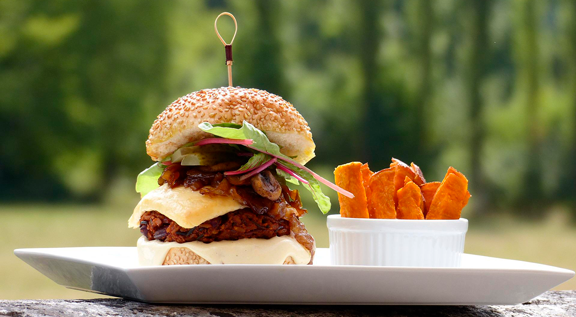
Image: Pixabay
A significant step in advancing the cultured meat market in Latin America has just been taken by Granja Tres Arroyos. The Argentine company, leader in food production in the country, has just announced its entry into the segment through a technical partnership with the Biotechnology Research Institute of the National University of San Martin. R&D efforts began a year ago and the goal is to have a pilot plant in the next two years.
For the cultured meat sector to reach commercial scale at affordable prices for the consumer, high investments in research and a robust production structure are necessary. It is this know-how that Granja Tres Arroyos and its 50 years of experience in the meat sector is bringing to this market.
This is not the first initiative in the area of protein cultivation in the country. Argentina was already the stage for the first tasting of cultured meat in South America, in July 2021. The feat was the result of research by the startup BIFE, from the bioengineering division of Laboratório Craveri and took place privately. The tasting served as an initial proof of concept, with no prospect yet of reaching the production stage for the market.
Argentina's commitment to protein cultivation confirms the downward trend in meat consumption in the country, which has reached its lowest level in 100 years. The potential of this movement is to impact the chain on a global scale, since Argentina is the largest consumer of meat per capita among emerging countries, according to data from CiCarne.
“With the union of efforts between the private sector and government agents, especially research institutes and regulatory agencies, it is possible to motivate the flow of capital and stimulate the development of researchers and professionals dedicated to this area that is so strategic for Latin America”, says Raquel Casseli, Corporate Engagement Manager at GFI Brasil.
In his opinion, Latin America could lead the world's cultured meat sector in the coming years. “Large players, mainly in Brazil, imported technology and built large laboratories so that in the future it will be possible to produce cultured meat at scale. It's a 100m sprint. It’s a scientific marathon”, says the expert.
Find out more about the initiatives in Brazil:
{module Form RD}
Brazil has the favorable conditions to become a leader in this industry and there are already large Brazilian companies implementing initiatives to make cultured meat a reality on the consumer's plate.
JBS will invest R$ 325 million over the next four years to develop cultured meat through its Biotech Innovation Center. In fact, its food innovation center in Brazil has vacancies open for scientists from different areas related to food innovation through the Specialists in Advanced Biotechnology program, which focuses on the production of cultivated meat.
In the field of startups, the latest news couldn't be more encouraging either. Ambi Real Foods, which was born with the promise of becoming the first Brazilian company to produce cultured meat with entirely national technology, has just produced its first beef burger prototype, with entirely national technology.
Sustinieri Pisces, a startup that also wants to be a pioneer in the production of farmed fish in Brazil, has completed the development stage of cell banks for five species of fish: Grouper, Grouper, Sea Bass, Sole and Mullet. “We are producing the Work Banks and will begin the process of using the bioreactors to produce a prototype (fish breading) by the first quarter of 2023.”, says Marcelo Szpilman, executive director of Sustinieri Pisces.
Furthermore, the first cell culture company focused on developing cultured pork fat, Cellva, has just entered the market. According to information from the company, “Cellva technology will provide animal fat that is substantially healthier and completely safe against the contamination that traditional pork fat can offer, with the exact flavor, texture and aroma.” The product may be incorporated into products of animal origin, cultivated or made from plants. The development of other foods from cell cultivation is also in the plans.
In the academic field, cultured meat has also attracted the attention of more and more researchers and generated the first results. Project coordinated by Profa. Dr. Aline Bruna da Silva from the Federal Center for Technological Education of Minas Gerais (CEFET MG), in partnership with the Federal University of Minas Gerais, has just produced the first prototype of cultivated structured chicken meat. The research that gave rise to the prototype (Hybrid scaffolds for cultivated chicken) was funded by the Good Food Institute, through the Research Incentive Program.
Using 3D printing technology, SENAI CIMATEC is developing cultured meat and the tests carried out so far seek to create formulations to achieve the texture, appearance and flavor of conventional meat.
In partnership with GFI Brasil, UFPR, through the Postgraduate Program in Veterinary Sciences, has already trained 107 students in the introductory discipline to cellular zootechnics, dedicated to studies of cultivated meat. The next step will be to develop the product in the laboratory.
The Senai Dr. Celso Charuri School started to offer a course on Cultivation Techniques with mammalian cell lines, with the aim of developing skills related to the cultivation of cell lines.
At the State University of Campinas (UNICAMP), the subject “Alternative Proteins: Made from Plants, Fermentation and Cultured Meat” is now offered within the Postgraduate program at the Faculty of Food Engineering. The objective is to train students by presenting the technical-scientific foundations of alternative proteins so that they can contribute to both the development of science and the growth of industry. In total, 29 students have already graduated.
Source: agrolink












